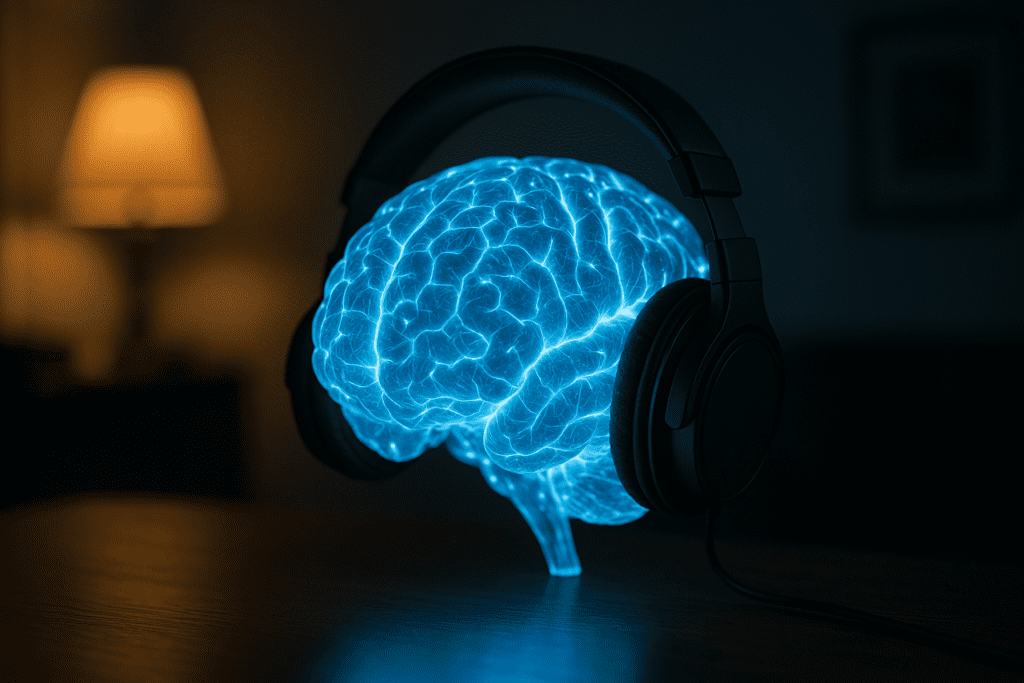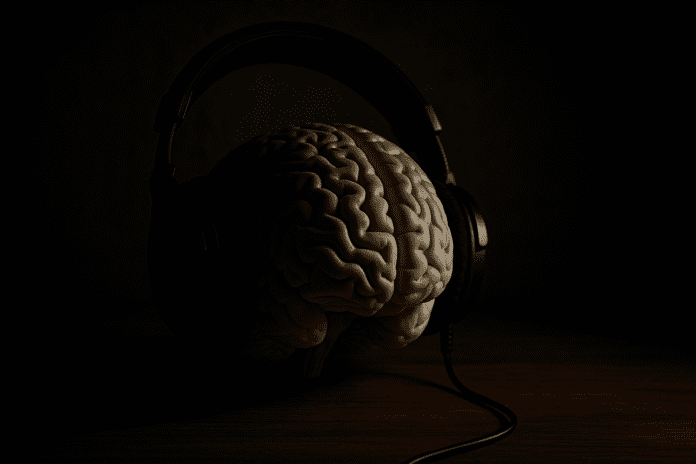In a world filled with constant digital distractions and cognitive overload, the ability to focus has become a prized mental asset. As researchers continue to investigate natural and non-invasive methods for enhancing cognitive performance, one surprising yet increasingly well-supported tool has emerged: music. Specifically, relaxing focus music and calm study music have garnered attention not only among students and professionals but also within the neuroscience and longevity communities. Beyond simply setting a mood, this genre of sound—comprising soft music for studying, ambient soundscapes, and meditation music for work—is proving to offer significant benefits for short-term concentration and long-term brain health.
You may also like: How to Improve Focus and Concentration: Proven Techniques for Boosting Mental Clarity and Productivity
Understanding the Neurological Impact of Music
Music is more than just entertainment—it is a multi-sensory experience that engages nearly every area of the brain. Functional MRI studies show that listening to music activates regions associated with attention, memory, emotion regulation, and executive function. For those who play music while working or studying, certain types—especially calm focus music—can synchronize brainwave activity in a way that enhances cognitive efficiency.
Scientific research has demonstrated that music set at a tempo of 60 to 70 beats per minute can induce a state of relaxed alertness, often referred to as the alpha brainwave state. This is particularly relevant for individuals engaging in sustained mental tasks. Concentration music for studying that maintains this rhythm helps stabilize attention and reduce susceptibility to internal and external distractions. As a result, soothing music to study can act almost like an auditory anchor, helping the mind remain present and attuned to the task at hand.
Additionally, music’s effect on neurochemical release cannot be underestimated. Listening to calm music for working has been associated with increased dopamine production, which not only enhances motivation but also improves working memory. Dopamine’s role in cognitive processing is well documented, and its natural stimulation through music offers a non-pharmacological method of improving mental performance. Oxytocin, the so-called bonding hormone, is also sometimes elevated during certain musical experiences, especially when music evokes emotional resonance. These neurochemical shifts can create a more positive mood, which is crucial for sustaining focus over long periods.

The Role of Relaxing Music in Reducing Cognitive Load
The modern brain is bombarded with stimuli, from incessant notifications to ambient noise pollution. This cognitive load taxes our working memory and diminishes our capacity to focus. Background music for studying, when carefully curated, can act as a cognitive buffer—masking disruptive background noise while providing a stable auditory environment that enhances mental performance.
The key lies in the type of music selected. Calm music for working, especially instrumental tracks without lyrics, minimizes linguistic interference, which can be detrimental when reading or writing. This is where relaxing focus music and musique focus become especially powerful. These soundscapes often blend gentle harmonic progressions with ambient textures, providing a soothing backdrop that supports deep concentration.
Furthermore, studies have shown that music designed for focus can regulate heart rate variability (HRV), a physiological marker of stress resilience. When HRV is optimized, the brain is more capable of sustaining attention and resisting mental fatigue. Soft music for studying, played at low to moderate volumes, appears to support these physiological states, offering both immediate and cumulative benefits for brain performance.
Moreover, reducing cognitive load through sound can be especially beneficial in high-stakes environments. For example, students preparing for major exams or professionals working under deadlines often experience cognitive fatigue. Introducing calming background study music during work sessions can decrease the effort needed to filter environmental distractions, thus preserving mental resources. Over time, the cumulative effect of this practice may lead to increased endurance for deep work, stronger neural pathways supporting executive function, and an overall sense of psychological resilience in demanding cognitive tasks.
Calm Study Music and Emotional Regulation
Cognitive function is inextricably linked to emotional state. Anxiety, frustration, and even low-grade stress can impair memory consolidation and working memory efficiency. In this context, calming background study music becomes more than an academic aid—it transforms into an emotional stabilizer.
Music that promotes relaxation and concentration can downregulate the sympathetic nervous system while upregulating parasympathetic activity, leading to a physiological state conducive to calm and clarity. Many users report that calm study music helps reduce anticipatory anxiety before exams, interviews, or creative performances. This emotional balance is not just subjectively perceived but also measurable through biomarkers such as cortisol levels and brainwave coherence.
Moreover, relaxing music for studying has been shown to activate the brain’s default mode network (DMN), which plays a crucial role in self-referential thinking and creative problem-solving. While excessive DMN activity can be detrimental during tasks requiring intense focus, a balanced level enhances cognitive flexibility. The ability of calming music to modulate this network underscores its therapeutic and cognitive-enhancing potential.
Interestingly, the emotional benefits of calm focus music extend to interpersonal relationships as well. Studies have shown that shared musical experiences can enhance social bonding and empathy. For those in collaborative academic or work environments, listening to relaxing music for studying in a group setting may encourage a shared sense of calm and increase mutual understanding. These emotional benefits reinforce the importance of music as not only a cognitive tool but also a social one.
Music for Work Focus in Professional and Creative Contexts
In professional environments, distractions are not only common—they’re often normalized. The open office layout, once hailed for promoting collaboration, has ironically become a breeding ground for mental fragmentation. Against this backdrop, music for work focus has emerged as a tool not just for individual productivity but also for workplace wellness.
Employers are increasingly encouraging the use of relax music for work to foster a calmer, more focused atmosphere. Whether it’s quiet music for working during complex analytical tasks or ambient study music to concentrate during deep work sessions, these auditory tools are becoming integral to modern productivity strategies. In creative industries, where flow states are essential, musicians and designers alike are turning to concentration music for studying and creation. These musical selections often include minimalistic compositions that reduce cognitive clutter, enabling the free association of ideas.
Importantly, music used for focus must be non-disruptive yet engaging enough to maintain alertness. This balance is often achieved through repetitive structures and harmonic predictability, characteristics that define most effective background music for studying. As individuals adapt their listening habits to task demands, they can enhance not only their immediate productivity but also their long-term cognitive efficiency.
In fields where high performance under pressure is critical—such as law, medicine, or finance—calm music for working may provide subtle cognitive reinforcement. By cultivating a sense of mental stillness, music allows professionals to think more clearly, communicate more effectively, and make decisions with greater confidence. As such, its value goes beyond ambiance; it becomes an integral part of a high-performance mindset.
Focus Music and Brain Plasticity
One of the most exciting areas of research in neuropsychology is brain plasticity—the brain’s ability to adapt and reorganize itself. Studies suggest that consistent exposure to certain types of music can enhance neuroplasticity, especially in regions responsible for attention, memory, and executive functioning.
Focus music, particularly ambient study music to concentrate, appears to promote synaptic connectivity by repeatedly engaging circuits involved in sustained attention. When this type of music is used consistently during cognitive tasks, it creates associative neural patterns that make it easier to enter and maintain a productive mental state. In other words, the brain begins to associate certain musical elements with deep focus and cognitive engagement, creating a feedback loop that reinforces performance.
Furthermore, long-term use of relaxation and concentration music may delay cognitive decline by supporting neural resilience. Some longitudinal studies have found that older adults who regularly engage with music—whether through listening or performance—demonstrate better preservation of cognitive function. This suggests that integrating calming background study music into daily routines could serve as a low-cost, accessible intervention for promoting brain health over the lifespan.
In addition, music has been shown to support neurogenesis—the formation of new neurons—in specific regions of the brain, such as the hippocampus. This is particularly relevant for aging populations, as hippocampal atrophy is associated with memory decline. Focus music may stimulate brain-derived neurotrophic factor (BDNF), a protein linked to neuroplasticity and cognitive protection. As science continues to uncover these mechanisms, it becomes increasingly clear that music is not just a cognitive enhancer but a powerful tool for long-term neurological vitality.
The Role of Culture and Personalization in Music Efficacy
Cultural background and individual personality play an influential role in how effective relaxing focus music is for any given listener. What resonates with one person as calming might feel unsettling or distracting to another. The subjective nature of musical interpretation means that individuals must explore different genres and artists to discover what best enhances their own mental performance.
Personalization in this context is key. Platforms offering curated playlists based on user behavior have shown promising results in matching individuals with music that sustains their focus over time. For example, some listeners may prefer classical piano as calming background study music, while others feel most productive with soft lo-fi beats or ambient electronic textures. The integration of AI-driven recommendation systems has also improved user experience by fine-tuning selections in real-time, depending on feedback and physiological cues.
Moreover, some individuals benefit from dynamic playlists that change gradually throughout a work session. These evolving soundscapes mirror natural cognitive cycles, helping users sustain attention while avoiding fatigue. By identifying patterns in listening behavior and matching them to task types, people can design an auditory environment tailored for maximum focus, creativity, or learning retention.

Music as a Tool for Anti-Aging and Longevity
The benefits of music extend far beyond productivity and focus. Recent research has begun to explore the impact of auditory stimulation on biological aging processes. Listening to music, especially calm and soothing varieties, has been associated with reductions in markers of oxidative stress, improved sleep quality, and lower inflammation levels—all of which contribute to healthier aging.
Meditation music for work, for instance, often overlaps with tracks designed to support parasympathetic nervous system dominance. By activating this system, the body experiences physiological changes that mirror those seen in meditation: reduced heart rate, lower blood pressure, and enhanced immune function. These effects are not only beneficial in the moment but may also compound over time to support brain longevity.
Cognitive reserve—the brain’s resilience to age-related damage—is enhanced through mentally stimulating activities. When relaxing music for studying is paired with complex tasks, it amplifies cognitive stimulation while mitigating stress, a major contributor to neurodegeneration. As such, background music for studying can be positioned not only as a productivity tool but also as part of a broader anti-aging lifestyle strategy.
Incorporating Calming Music into Daily Routines
The most effective way to reap the cognitive benefits of music is through intentional integration into daily routines. Rather than relying on passive or occasional listening, users can design specific environments enriched with calm music for working or study sessions. This creates auditory cues that signal the brain to enter a focused state, much like a conditioned response.
Start by selecting playlists that align with your task—whether it’s study song collections for academic work or relax music for work when tackling professional duties. Over time, the brain forms strong associations between these musical patterns and the cognitive states they support. This can help establish consistent focus habits and reduce the cognitive friction of task switching.
It’s also beneficial to experiment with different genres and tempos. While ambient music is widely popular for focus, some individuals respond better to rhythmic minimalism or even certain types of jazz or classical pieces. The key is to pay attention to how each type of calming background study music influences your concentration and emotional state.
For those working in shared or noisy environments, quiet music for working can provide a much-needed auditory buffer. In such settings, using noise-canceling headphones with personalized playlists can significantly enhance focus and emotional regulation. By deliberately shaping the auditory landscape, individuals can regain control over their mental environment and improve both their performance and well-being.
The Future of Music and Cognitive Enhancement
As the intersection between neuroscience and technology continues to evolve, so too does our understanding of how music can be harnessed to enhance cognition. Wearable devices that monitor brainwave activity, heart rate variability, and emotional states are already being paired with AI-generated music to create adaptive soundscapes. These systems adjust in real-time to keep the listener within optimal cognitive and emotional states, maximizing the benefits of relaxation and concentration music.
Such innovation opens exciting possibilities for the future of brain health. Whether used in clinical settings for neurorehabilitation or as part of preventive strategies for cognitive decline, calm focus music and similar auditory tools are likely to play an increasingly central role. They offer a low-risk, high-reward intervention that is accessible, customizable, and deeply rooted in the human experience.
In parallel, educational institutions and workplaces are beginning to recognize the value of providing environments enriched with relaxing music for studying and productivity. As the evidence base grows, we can expect more formal guidelines on how to use music for cognitive enhancement, emotional regulation, and even chronic stress management.
Frequently Asked Questions: The Science and Application of Relaxing Focus Music for Cognitive and Emotional Health
1. Can relaxing music improve productivity in tasks requiring sustained focus?
Absolutely. When individuals engage in mentally demanding tasks, introducing calm study music can help foster a more stable attention span by creating a consistent, non-distracting auditory environment. This type of focus music reduces the mental effort required to filter out environmental distractions, freeing up cognitive bandwidth. It’s particularly useful in time-blocking workflows, where concentration music for studying can help mark cognitive boundaries between rest and work. Unlike silence, which can be interrupted by sudden sounds, soft music for studying maintains a steady sonic field that improves flow and mental endurance. Many professionals use background music for studying or music for work focus to remain in peak performance zones longer.
2. How does listening to relaxing focus music compare to other cognitive enhancement techniques like nootropics or meditation?
While nootropics target neurochemical pathways and meditation rewires attention networks through long-term practice, relaxing focus music offers a middle ground—an immediate yet subtle enhancement to cognitive performance. The effects of ambient study music to concentrate are almost instantaneous, offering benefits without requiring pharmacological intervention or intensive training. Used together with relaxation and concentration music, meditation music for work can reinforce attentional stability while supporting emotional calm. Unlike supplements that often come with side effects, relaxing music for studying is risk-free and can be finely tuned to suit different environments. Many find combining meditation, calm music for working, and mindfulness provides a synergistic cognitive advantage.
3. What are the long-term cognitive benefits of using calm focus music during learning or work sessions?
Research suggests that using calming background study music consistently can help reinforce neural circuits responsible for sustained attention and memory retention. Over time, the brain begins to associate specific auditory patterns with focus states, creating a type of classical conditioning that primes mental readiness. Students often use study study song playlists that gradually become cognitive cues, making it easier to shift into deep work. Additionally, incorporating music for work focus into daily routines helps reduce chronic stress, a known factor in age-related cognitive decline. These benefits extend to long-term neuroprotection, particularly when soothing music to study is part of a broader brain-health strategy.
4. How does musique focus differ across cultures and what role does cultural preference play in its effectiveness?
Musique focus is profoundly influenced by cultural background, which shapes emotional and cognitive responses to different musical styles. For instance, someone raised with Indian classical music might find its rhythmic cycles more conducive to focus than Western piano compositions. Personal history and exposure affect how the brain interprets harmony and rhythm, meaning that effective calm study music must be personalized. This explains why global platforms now allow users to curate their own relaxing music for studying playlists based on genre, tempo, and instrumentation. The more aligned the background music for studying is with an individual’s cultural and emotional context, the more effective it becomes.
5. Can listening to calming music be beneficial even outside work or study settings?
Yes, the benefits of calm focus music extend beyond academic or professional contexts. For example, soft music for studying is frequently used in therapeutic settings to assist with anxiety disorders, PTSD, and even pain management. The physiological response to calming background study music—such as reduced heart rate and lowered cortisol levels—makes it ideal for daily stress management. Relax music for work settings can be adapted for use during commutes, meals, or even household chores to create a sense of serenity. Incorporating focus music into daily transitions also helps structure routines, providing auditory cues for calming down or preparing mentally for a new task.
6. How can I determine which type of relaxing focus music is best suited to my work or study needs?
It often requires experimentation to find the most effective concentration music for studying, as preferences can vary by cognitive task and time of day. For example, rhythmic ambient study music to concentrate might enhance logical problem-solving, while slower classical pieces could be better suited to writing or reflection. Digital platforms offering customizable playlists based on focus goals allow users to test different genres and tempos. Pay attention to physiological cues—like breathing, stress levels, and ability to stay immersed—as these indicate whether a track supports or distracts from focus. Once identified, using quiet music for working at consistent times helps establish a conditioned response that boosts long-term productivity.
7. Are there any risks or downsides to relying on music for work focus or studying?
While generally safe and beneficial, over-reliance on calm music for working may limit adaptability in environments where listening isn’t possible. For instance, if a student always uses soothing music to study but enters a silent exam room, their performance may suffer due to lack of auditory cues. Additionally, complex or vocal-heavy tracks might interfere with verbal processing tasks, such as reading comprehension or language learning. It’s also essential to monitor volume levels; music that’s too loud can increase cognitive load rather than reduce it. Rotating between silence, focus music, and ambient sounds ensures flexibility in different focus scenarios.
8. How is focus music evolving with emerging technology?
New developments in biofeedback and AI are revolutionizing how we use relaxation and concentration music. Some apps now integrate real-time data—like heart rate variability or EEG patterns—to adjust music dynamically based on the listener’s cognitive state. These smart systems can fine-tune meditation music for work sessions to prolong concentration or initiate relaxation when stress markers spike. Personalized soundscapes are becoming increasingly common, using machine learning to adapt to your unique focus rhythms. As this technology advances, we can expect more immersive experiences where ambient study music to concentrate responds in real time to our mental and emotional needs.
9. Can relaxing focus music improve social collaboration in group settings?
Surprisingly, yes. While we often think of music as a personal experience, certain types of calm focus music can enhance group dynamics by setting a harmonious tone. In co-working spaces, playing quiet music for working in the background can reduce tension, increase tolerance, and promote smoother communication. Group brainstorming sessions also benefit from low-volume focus music, which can reduce social anxiety and foster creative exchange. This communal use of relaxing music for studying can act as a social lubricant, encouraging cooperation and mutual empathy. As hybrid work models grow, curating shared sound environments may become as important as choosing office layouts or lighting.
10. What role can relaxing focus music play in aging populations or neurodegenerative conditions?
Emerging research indicates that music for work focus and related genres may support cognitive function in older adults, particularly those with neurodegenerative diseases like Alzheimer’s. Music stimulates multiple brain regions simultaneously, maintaining neural activity in areas vulnerable to decline. Regular engagement with calm study music may help preserve memory pathways, delay onset of symptoms, and reduce agitation in dementia patients. Moreover, using background music for studying-type soundscapes during memory training can enhance retention in aging populations. These findings suggest that music, especially relaxation and concentration music, holds therapeutic promise as part of holistic cognitive care in elder health strategies.

Conclusion: Why Relaxing Focus Music Deserves a Place in Your Cognitive Wellness Toolkit
Incorporating relaxing focus music into your daily life is more than a lifestyle trend—it is an evidence-based approach to improving mental performance and protecting long-term brain health. From reducing stress and enhancing attention to fostering emotional resilience and supporting healthy aging, calm study music and its related genres offer a multifaceted tool for optimizing cognitive function.
By understanding the science behind how soft music for studying and meditation music for work affect brain activity, individuals can make informed choices about their listening habits. Whether you are a student looking for the best concentration music for studying or a professional seeking quiet music for working, the key lies in intentionality and personalization. With consistent use, background music for studying can become an integral part of a broader strategy for mental clarity, emotional balance, and cognitive longevity.
Ultimately, the right kind of music can help create a sanctuary for your mind—a rhythmic refuge from the noise of the world, where focus and relaxation coexist. Embracing this practice may be one of the most accessible and enjoyable steps you can take toward lifelong brain health and cognitive vitality.
mental clarity techniques, cognitive enhancement strategies, brain-boosting activities, audio therapy benefits, neural entrainment music, stress management tools, productivity soundscapes, workplace wellness strategies, emotional regulation through sound, auditory focus techniques, music therapy neuroscience, studying efficiency hacks, deep work environment, cognitive resilience habits, neuroplasticity and learning, ambient sound productivity, attention span improvement, sensory processing and music, concentration aid methods, focus enhancement without stimulants
Further Reading:
Why is music good for the brain?
The Science Behind Meditation Music and Its Positive Impact on Mental Health
How Music Can Sharpen Your Mind And Enhance Brain Function
Disclaimer
The information contained in this article is provided for general informational purposes only and is not intended to serve as medical, legal, or professional advice. While Health11News strives to present accurate, up-to-date, and reliable content, no warranty or guarantee, expressed or implied, is made regarding the completeness, accuracy, or adequacy of the information provided. Readers are strongly advised to seek the guidance of a qualified healthcare provider or other relevant professionals before acting on any information contained in this article. Health11News, its authors, editors, and contributors expressly disclaim any liability for any damages, losses, or consequences arising directly or indirectly from the use, interpretation, or reliance on any information presented herein. The views and opinions expressed in this article are those of the author(s) and do not necessarily reflect the official policies or positions of Health11News.


